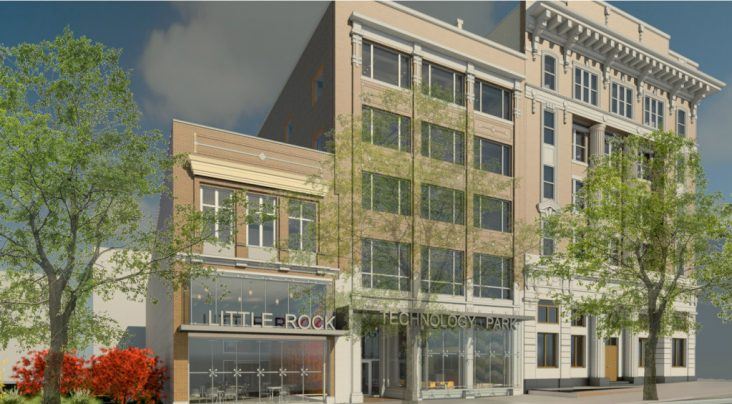Tech Park unveils designs for downtown village to attract startups, entrepreneurs
by December 9, 2015 9:06 pm 223 views

The Little Rock Technology Park Authority on Wednesday (Dec. 9) unveiled the architectural plans for the first phase of the much-discussed multimillion dollar downtown development that has been in the works now for eight years.
Chad Young, principal and chief designer at Little Rock’s Wittenberg Delony & Davidson Architects, gave a 40-minute presentation where the board and other attending the authority’s monthly board meeting got a first look at the city-financed project to lure established IT companies, startups, knowledge-based firms and entrepreneurs to Little Rock’s Creative Corridor.
Young and Brent Birch, the tech park’s executive director, said the local architectural firm came up with the unique multidimensional, interconnected collaborative space after visiting similar technology-focused centers across the U.S., including the Emerge Memphis and the Atlanta Tech Village.
“This is going to be a really great tool for creating innovative collaborative space, and going to be a great recruiting tool to bring startups to come to this facility,” Young told the seven-person board. “We want to create a reason for people to get together … and share ideas with this design.”
The preliminary designs for the initial phase of the development would connect three Main Street office buildings together to create a 42,000 square foot, six-floor complex that will include have 76 private offices and 75 open spaces. Some of the other features include a coffee bar, office suites, meeting and event space, indoor bike racks, a corporate-level conference room, 24/7 access and onsite parking.
The key pieces of the development will be the three adjacent properties owned by the 415 Main Group LLC, Five Main LLC and DMT Ventures LLC. The 415 Main partnership is led by Little Rock Attorney Richard Mays, who accepted a $1.03 million offer from the tech park board about two weeks ago to purchase his centrally-located downtown law offices.
That pact with Mays diffuses a potential legal battle between the Little Rock attorney and the publicly-financed authority, who had filed dueling lawsuits with the former Arkansas lawmaker after the board made do on its threat to seize his property through a narrowly defined “public use” statute in the state’s eminent domain law. Board member Dickson Flake said he delivered a final contract on Monday to Mays, and hopes to close a deal to purchase the property within a week.
“There is one item to work not related to the (contract),” Flake said. “Hopefully, we will have the (deal) completed by the end of the week or early next week.”
The other two buildings, at 417 and 421 Main Street, are both owned by a Warren Stephens-led limited liability partnerships that will eventually connect to the Mays building. The tech park board has until mid-January of next year to close its $11.6 million deal to purchase those properties.
After Young’s presentation, most of the board members seemed happy with the architectural design, but discussed possible alterations to the plan – including adding a rooftop patio space and other amenities.
“Don’t rule out the possibility,” Tech Park Vice Chair Kevin Zaffaroni told Birch and Young of the rooftop idea. “But what I have seen so far, this (plan) is magnificent.”
Birch told the board that he and Young’s firm still have to make sure that the design plans meet the authority’s final budget before completing a final draft. According to Young, if all goes as planned construction on the project will begin in early March.
At a specially call meeting three weeks ago, the authority approved a measure by a vote of 5-1 to accept a letter of commitment from a local bank consortium to finance the first phase of the project through a $17.5 million loan over a 72-month term.
Under the terms of the proposed deal, the financial consortium would provide necessary funding in two parts to begin Phase 1 of the downtown project at fixed interest rates 4.19% and 2.95% over a period of six years. The $17.5 million loan will consist of two promissory notes, one taxable in the amount of $7.9 million and the other tax-exempt at $9.6 million.
Details and architectural renderings of the initial phase for the downtown project, which is expected to be completed over several years in at least five stages, can be found on the tech park’s newly designed website here.
